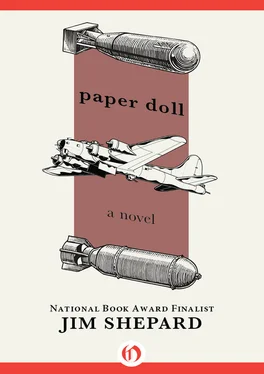She went upstairs to send Gordon back to his room when the clock read 3:30 by the light of a kitchen match. Bryant remained in the chair, too excited to sleep, imagining she would come back down in a filmy nightgown and a torrent of emotion. After a few minutes the upstairs fell completely silent, and he lingered unhappily on the prospect that she was still tossing and turning quietly, her resistance breaking down. He dozed eventually and dreamed of Vera Lynn singing to him at a barbecue, and when he awoke, Jean was clinking around the kitchen, making ersatz coffee, and it was cool and light in the living room. He rose stiffly and said hello with a weak smile. “Waiting for Father Christmas?” she asked. She removed the blackout shutters and behind her, when his eyes adjusted, he could see daffodils under the apple trees, the lawn grayed with dew.
“They’re both sleeping,” she said. They sat in silence, Bryant self-consciously attempting to mat down his hair and clear the sleep from his eyes. When the water was ready, she poured the coffee. It smelled like the woods.
“What’s the ditty? ‘Because of Axis trickery, my coffee tastes like chicory,’” she said.
He smiled. “It’s fine.” He was determined not to make some sort of horrible gaffe by referring to her troubles.
She was listening to the morning noises of the cottage. “How long has Gordon been having those dreams?” she asked.
He looked away, embarrassed. “Since a mission we flew a little while ago. He said they were getting better.”
She sniffed skeptically. “I’m happy not to have seen them earlier, in that case.”
“Was he a bother?”
She laughed aloud. “You’re a queer one, Bobby Bryant. I can’t decide whether you’re very nice or very thoughtless. Probably both.”
He was taken aback. “Why do you say that?”
She waved him off, her attention returning to the garden. Puff was hunched near the bluebells.
“Maybe she sees something,” Bryant suggested.
“Her friend’s buried there,” Jean said. “A stray. Passed on in her sleep, very mysterious. We buried her in the garden yesterday morning before you came.”
Puff pawed at the tilled ground. The loose earth popped and trembled.
“Puff isn’t giving up,” Jean said.
The cat dug more frantically. Dirt ridged her forehead, above the eyes.
“Jeez,” Bryant said. “Kind of morbid.”
Puff plunged in and pulled, struggling, and the ground heaved and broke loosely and the weight below came free slightly, a paw showing like a lost mitten. Puff sprinted a foot or so away and turned to watch, coiled. Nothing happened. Puff watched, clumped dirt falling from her head and back like the coating from fried chicken.
Jean watched without expression. Bryant rubbed his nose.
Puff lay in the frosted grass, looking on with complete concentration. They rose finally and went into the garden to retrieve her, scuffing dirt over to rebury the exposed paw. They brought Puff inside and cleaned her with damp soft dress remnants used for rags, and while she lay around licking herself with detachment, the final hour of Bryant’s leave passed with the two of them gazing on the yawning cat in glum silence before going to wake the rest of the house so that the boys could get back to base on time.
They were going on practice missions, the CO told them, and they were going to take them seriously, and if they didn’t take them seriously, they were going to end up dead. Collisions during assembly were becoming all too frequent as larger and larger bombing groups were attempted for the raids. Six aircraft had been lost in other squadrons in the last five days without enemy intervention. Fifty-seven men. Pilot error and insufficient vigilance, especially in poor visibility, were the official culprits. The CO demonstrated with his hands flattened and bobbing closer to one another: heavily laden bombers momentarily unbalanced by turbulence had little room for safe recovery in a tight combat formation. At times single aircraft and even whole formations were becoming lost and crossing into the formations of others in the general pre-dawn chaos. The 341st nearby had had the particularly humiliating distinction of having to abandon a mission altogether.
They were going to work on assembly. The assembly ship was to be the first off the airfield, and would fly to the designated point and begin firing flares. They were to follow at minimum intervals and assemble in formation as quickly and efficiently as possible.
The assembly ship was a battle-weary B-24 called You Can’t Miss It. It was bright yellow with huge red polka dots, and a kelly green tail. The men loved on fairly clear days such as this to fly right up to it and earnestly ask for radio confirmation of its status as assembly ship.
If the balloon didn’t go up in the next few days, the CO continued, they could count on additional gunnery training flights. The standard procedure had been to fly over the British coastal ranges firing away at the targets towed by tired old RAF Bostons. Now that was a job, Lewis said, that had to be the most dangerous in the armed forces, towing those targets while planeloads of ginks and shnooks let fly.
Bomber Command, the CO mentioned with exaggerated care, had reason to believe that the gunnery instructors back in the States had not been as precise in their scoring of cadet shooting as they might have been. The comment got a big roar of laughter from the aircrews. A month earlier in one of those spectacularly embarrassing incidents the Air Corps seemed able to produce every four weeks or so, one of the target-towing Bostons had been shot down. The Brit pilot had hit the silk so angry he had brandished a revolver at the contrite B-17’s that flew past his chute.
Bryant found himself climbing with Paper Doll up through white cumulus clouds and gray sky. Lewis was singing a parody of “Into the Air, Army Airmen” over the interphone: Into the air, Junior Birdman, get your ass into the blue. The plane banked sharply and he knew he was supposed to be remaining vigilant in his lookout for the assembly plane and others, but the view through breaks in the cloud entranced him: visibility distended in a pleasant and sleepy way by a slight haze all the way to the Dutch coast and deep into France, the muted colors receding into the curvature of the earth. The earth closer to home resembled the subdivided palette of Robin’s paintbox. Cooper had switched the crew’s interphone to Liaison, and Bean tuned them into the BBC, and they climbed higher into the great chamber of air above the cloud cover listening to an alto voice singing opera.
Hirsch spotted the assembly plane and within minutes they had slipped into a slot above it and behind Geezil II and Leave Me Home , which had achieved its name by three times developing engine trouble on the transoceanic flight to England and three times having had to turn back.
They found themselves enduring the usual casually harrowing jockeying and shifting in formation as they circled in an ever-growing group, the clouds like shoals beneath them. Bryant could hear the guff Gabriel and Cooper were taking — Close it up! Close up the formation, goddamnit! — from the pilot of the lead plane.
From above and behind, three more 17’s appeared and drifted down to them. Bryant called them in to Gabriel and said aloud, Now where’re they coming from? They eased terrifyingly close and suddenly everyone in Paper Doll was shouting, as if the other crew could hear. Gabriel had no room to maneuver and shouted as much back in response over the interphone when they yelled for evasive action. The closest 17 bobbed higher with an infuriating casualness after having dipped so low that its ball turret had been momentarily level with Bryant in his dorsal. The ball turret gunner had waved.
Читать дальше












